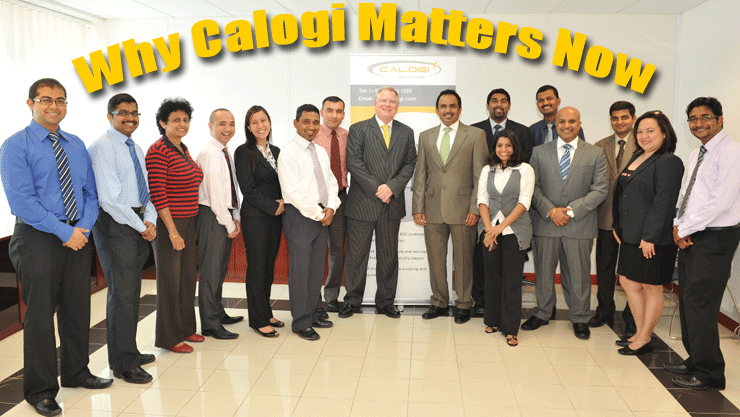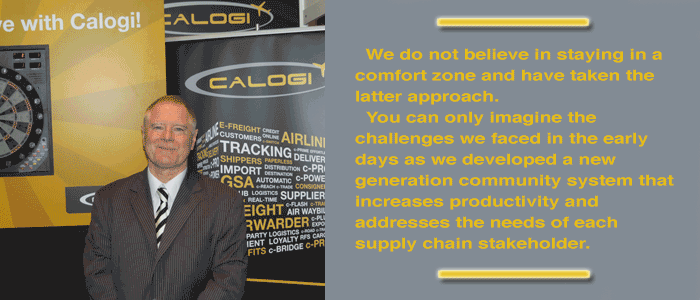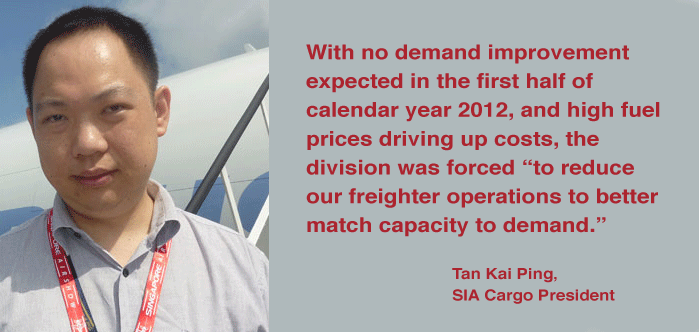| 
Patrick Murray talks about innovation
and building fast-growing Calogi with great enthusiasm and hope.
Murray is no stranger to IT, having been involved with various systems—from
British Airways to IATA to Mercator.
But as we learned during a conversation
in Dubai recently, Calogi is building change for the world air cargo
community from the ground up.
Amidst a growing number of IT companies,
fast-rising, Dubai-based Calogi is providing a secure Internet service
portal “that offers a one-stop platform for a range of air cargo
businesses from around the world to negotiate and sell products and
services online.”
2011 was quite the year for Calogi, which
completed its goals after 4 years of development and “over 140
man-years of effort,” says Mr. Murray.
 |
A number of modules were added to Calogi’s
growing list of IT solutions, including: A third party logistics module,
“which allows 3PL service providers to sell products and services
such as dangerous goods packing, warehousing, and transportation to
their customers”; c-prime, “a module which allows forwarders
and airlines to ‘brand’ Calogi as if it were their own web
site”; a change to our message broker to allow traditional SITA
type B messages using email and FTP; an upgrade to the booking engine
to allow booking of shipments either through the traditional EDI route
or online; a module which allows the GHA to create accounts with forwarders,
issue invoices and reconcile the money collections; c-Club, “a
loyalty program for the air cargo supply chain business,” which
allows any seller of services on the portal to run his own flexible
loyalty scheme with any buyers on the portal. The loyalty program can
help to “solidify existing relationships, initiate new relationships,
and convert one-time customers into repeat business,” (two major
airlines are already in participation); a courier module “which
allows integrators to issue air waybills and courier baggage vouchers.”
Despite a downturn in DXB traffic, Calogi
has increased its membership and transactions by over 28 percent—and
2012 looks even better.
Calogi is looking to expand its influence
beyond Dubai to offer cost-effective e-freight solutions to others looking
for high-value answers.
“We have already identified our
target markets and are working on a penetration strategy. If we have
got it right, and the indications and feedback from our surveys suggest
we have, we could see the number of subscribers and transactions double
in the coming year,” says Mr. Murray.
While he remains mum on all the current
developments Calogi has to help customers increase their business, there
are certain ideas he will share:
“I am still keen to see an innovative
security solution whereby an x-ray image of the shipment, from a trusted
source, can be made available, through Calogi, for inspection by Customs
at the destination, prior to aircraft loading.
“The Customs inspection at the destination
can then choose to allow the shipment to be accepted for import or not.
I think this could resolve a number of issues.”
The ideal thing would be to “replicate
the Dubai business model at other airports,” but Mr. Murray knows
“this may not be possible in the first year.”
“It’s all going to be about
implementing change. We would still like to see a world where air cargo
supply chain stakeholders can implement 100 percent e-freight penetration
and remove all paper forms, not just those that travel with the freight,
such as Airline/ Ground Handling Invoices, Statement of Accounts, Airlines
Sales Reports, Agents Sales Reports, Stock Reports, Shippers Letter
of Instruction, Charges Correction Advices, the Air Waybill and the
House Air waybill,” says Mr. Murray. This will be Calogi’s
most difficult task given all the different regulatory hoops that must
be jumped through in order for everything to work effectively.
Lufthansa just sold its interest in TRAXON,
which makes us wonder why owning an IT group is a good thing, but Mr.
Murray assures us that Calogi is not so much an IT group as it is a
“supply chain solutions provider.
“I am aware that some strategists
believe that airlines should focus on their core business of flying
passengers, while other are happy to diversify into new businesses to
spread the financial risk and increase revenues.
“We do not believe in staying in
a comfort zone and have taken the latter approach.
“You can only imagine the challenges
we faced in the early days as we developed a new generation community
system that increases productivity and addresses the needs of each supply
chain stakeholder,” said Mr. Murray.
Moving the Dubai model elsewhere may seem
like a smooth and easy business, but only for those with little knowledge
of the initial challenges Calogi faced in Dubai.
“Less than 30 percent of shipments
were processed through automated means. Around 380 forwarders did not
have an IT solution.
“The cargo terminals captured AWB
data manually as part of the acceptance process.
“Dnata staff also spent a large
proportion of time handling cash and issuing receipts. 120 full-time
staff were manning the export counters and resolving disputes over airline
contracts, ad-hoc and rack rates. (The 120 full-time staff cover the
seven cargo facilities operated by dnata in DXB and Dubai World Central
Airport).
Of all the issues with implementing an
efficient IT system in Dubai, four stood out to be the most egregious.
“Airlines could only do business
with a limited number of large forwarders; the Dubai air cargo industry
ran on paper, (with) several documents required to move a shipment from
A to B; ad-hoc rate slips were handwritten, (which) often led to disputes
(that) took a long time to resolve (and also meant) confidentiality
could not be guaranteed, and airline published rates distributed via
letter and fax led to late implementation and loss of revenue; air waybill
stock was distributed via email and airlines relied on the forwarder
or GHA to manage the usage, (which meant) no one knew the status of
the shipment until it arrived in the warehouse,” said Mr. Murray.
In 2009, Calogi implemented their changes
in the Dubai community, with many positive results. Small freight forwarders
could now do business on a larger scale for less money, with the Calogi
system allowing them to “auto-rate and execute master house air
waybills, interface with airlines and the GHA, and track shipments on
the portal.” Gone were the cash transactions and offline invoicing
and payments; with Calogi, each forwarder had a credit account intermediary
and could track the status of their accounts in real time.
“Calogi’s unique ad-hoc air
waybill release feature enabled each airline/GSA to do business with
all Calogi forwarders in Dubai.
“The airline made a pool of air
waybill stock available to the community and each forwarder had the
option to assign an air waybill to a particular job. “Upon execution
of the air waybill, the monies were deducted from the forwarders Calogi
credit account and credited to the airline,” said Mr. Murray.
This system also allowed the airline to retain a portion of the air
waybill fee, “a source of income that did not exist prior to the
Calogi implementation.”
Where once before an airline or forwarder
was left sending and receiving stacks of paper, now most paper documents
were digitized, including “Invoices, Statement of Accounts, Airlines
Sales Reports, Agents Sales Reports, Stock Reports, Instruction for
the Despatch of Goods, Charges Correction Advices, the Air Waybill and
the House Air Waybill.”
Airlines and GSAs now assumed the responsibility
of maintaining and publishing rates, with only the airlines and forwarders
being privy to those rates, which reduced the number of rate disputes
and improved confidentiality.
The success of Calogi is truly all in
the results provided.
“Dnata were able to reduce the counter
staff by 60 percent, redeploying them to much needed areas. This resulted
in cost savings to Dnata of nearly one million dollars per year.
“Calogi settled over $9M USD in
airline dues in the first year of operation. “The airline also
received $9 USD for each air waybill executed from the pool of stock
made available to the community. Not only did Calogi create a financially
risk free environment, it also created a source of income for airlines.
“Dubai has the capability to become
a 100 percent e-freight station, which will save the local industry
millions of dollars.
“Rate disputes and revenue leakage
have almost disappeared.
“The shipment and flight revenue
data are available instantaneously. By having immediate access to this
data, airlines can identify the source of revenue shortfalls and develop
strategies to address the same,” said Mr. Murray.
There are many reasons air cargo needs
Calogi. By entering data into an online ‘cloud,’ data need
only be entered once—it can be reused infinitely and with complete
transparency. The absence of paper creates a green solution that is
also cost-effective—there are no expensive messaging costs. Calogi
is also “the only system that unites the major air cargo supply
chain stakeholders on one platform,” said Mr. Murray.
“We bring a new dimension to the
airfreight industry in the form of credit management. Distributing stock
to a forwarder is no longer like issuing a blank check.
“Instead, airlines can decide the
amount of financial risk they are willing to take with each forwarder
by setting credit limits.
“We now have a number of contracts
signed with 3PL operators who will be offering their products and services
to Calogi stakeholders. Once again, they are able to control the amount
of credit offered and defer to the Calogi account if they would like
to transfer the risk.
“We offer small airlines, GSAs and
forwarders the opportunity to ‘brand’ Calogi as their own
web site. Users logging on will be directed to the airlines, GSA’s,
or forwarder’s branded version of Calogi.
“After logging in the users will
only be able to access the products and services offered by that specific
company,” said Mr. Murray. Calogi is essentially bringing an IT
solution to the air cargo community the way eBay brought a marketplace
solution to the small seller.
“For a fraction of the price of
building, testing and supporting a web site, smaller companies can harness
the rich functionality of Calogi to distribute their products to their
customers.
“We have not forgotten the Ground
Handling Agents (GHA) role either. Calogi Forwarders are able to share
shipment information with the Cargo Terminal Systems, thus avoiding
the need for the GHA staff to rekey data, allowing the forwarder to
bypass the terminal counters and proceed directly to the delivery dock
with his shipment.
“Prior to delivering the cargo the
forwarder is able to book an off-peak, normal or peak dock slot using
Calogi (This feature is also available for import shipments).
“Each slot type is priced differently
to encourage the forwarder to deliver/collect the shipment during periods
of low activity (off-peak) to spread the terminal workload and avoid
congestion.
“Furthermore, Dnata shares its cost
savings with the agent community in the form of preferential (discounted)
documentation and cargo handling rates, a benefit which usually outweighs
the Calogi cost by far.
“We will continue to develop Calogi
to keep abreast of industry standards and initiatives.
“We have two philosophies: to continue
to support the industry by developing and testing features and make
them available on the portal, thus helping our stakeholders to keep
their costs down, and to increase our income by increasing the volume
of users and transactions, thus keeping the price down.
“Even an exporter who has one or
two shipments a week has found our system extremely cost effective,”
said Mr. Murray.
Geoffrey/Flossie |





